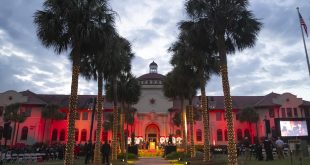The African American Studies program has been honoring the accomplishments of Valdosta State University graduates for years, and this year will mark its Tenth Annual Multicultural Sankofa Celebration on May 5 at 6 p.m. in the Student Union Theater.
The ceremony will acknowledge spring, summer and fall 2011 graduates.
The words “san” (return), “ko” (go) and “fa” (look, seek and take) are from the Akan language of Ghana, which translates in English when formed together, “to go back and take.”
The Akan word embodies the individual’s active role in his or her lifelong quest for liberating knowledge through insightful understanding of situation and the relations between things, thus creating an enlightened and insightful individual who is free and creative.
The Adinkra symbol that appears frequently in traditional Akan art is also commonly associated with sankofa—a bird with its head turned backwards—which is often connected with the proverb “It is not wrong to go back for that which you have forgotten.”
The culture that is centered on its origin reflects the Akan belief that the past serves as a guide for planning the future or that the wisdom in learning about the past builds the future.
Dr. Shirley H. Hardin, English professor and director of African American Studies, has been overseeing Sankofa for years, along with a committee of helpful students and willing leaders.
“Sankofa provides graduates and their parents and/or spouses a chance to celebrate individual achievements and collective triumphs that may not be acknowledged in a more traditional setting,” Dr. Hardin said.
During this year’s ceremony, AFAM will also be announcing several awards, which include the AFAM Student of the Year, the Multicultural Sankofa award, the AFAM Teacher of the Year and a newly created Community Servant of the Year award.
Chardonnay Watson, graduate student and program chair, participated in Sankofa at her alma mater in 2010 at UGA, but this will be her first year organizing the event at VSU.
“Students should acknowledge that in order to understand our present and ensure our future, we must know our past, and Sankofa teaches us that,” Watson said. “We should reach back and gather the best of what our past has to teach us, so that we can achieve our full potential as we move forward.”
Latoya Long, senior economics major and assistant program chairperson, is also working with Sankofa for the first time and is excited about the ceremony.
“I am looking forward to the overall experience of fellowshipping with my fellow graduating seniors, also the speaking, dancing, and singing,” Long said.
Sankofa is open for all students who wish to participate. For graduating seniors participating in the lineup, there is a slight dress code that requires they come in their graduation gowns, but dressing in black will also be acceptable.
 The Spectator The independent student newspaper of Valdosta State University
The Spectator The independent student newspaper of Valdosta State University





